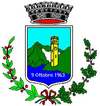Erto
| Erto e Casso | ||
|---|---|---|
| Comune | ||
| Comune di Erto e Casso | ||

View of a central road in Erto
|
||
|
||
 Erto e Casso within the Province of Pordenone |
||
| Location of Erto e Casso in Italy | ||
| Coordinates: 46°16′37.31″N 12°22′19.13″E / 46.2770306°N 12.3719806°ECoordinates: 46°16′37.31″N 12°22′19.13″E / 46.2770306°N 12.3719806°E | ||
| Country | Italy | |
| Region | Friuli-Venezia Giulia | |
| Province / Metropolitan city | Pordenone (PN) | |
| Frazioni | Casso, Erto | |
| Government | ||
| • Mayor | Luciano Giuseppe Pezzin | |
| Area | ||
| • Total | 52.3 km2 (20.2 sq mi) | |
| Elevation | 775 m (2,543 ft) | |
| Population (31 December 2008) | ||
| • Total | 388 | |
| • Density | 7.4/km2 (19/sq mi) | |
| Demonym(s) | Ertani | |
| Time zone | CET (UTC+1) | |
| • Summer (DST) | CEST (UTC+2) | |
| Postal code | 33080 | |
| Dialing code | 0427 | |
| Website | Official website | |
Erto e Casso is an Italian municipality in the Province of Pordenone in the Italian region Friuli-Venezia Giulia, located about 130 kilometres (81 mi) northwest of Trieste and about 40 kilometres (25 mi) northwest of Pordenone.
The commune consists of Erto (the municipal seat, population: 341), Casso (population: 35), and some smaller places: Cavalle, Col della Ruava, Forcai, Liron, Pineda, San Martino and Val del Pont.
Erto e Casso borders the municipalities of Castellavazzo, Cimolais, Claut, Longarone, Ospitale di Cadore, Perarolo di Cadore, Pieve d'Alpago, and Soverzene. All the bordering municipalities, except Cimolais and Claut, are part of the nearby Province of Belluno, in Veneto.
The comune is composed by the main settlements of Erto, the administrative seat, and Casso. The other hamlets, (frazioni), composed by few scattered farmhouses, are the localities of Forcai, Pineda, San Martino, and Val da Pont.
The village of Erto was first mentioned in 8th century. Differently from Casso, in which is spoken bellunese (a Venetian dialect), the local language is a dialect of Ladin language, colloquailly named ertano.
Erto and Casso were the two villages in the Vajont (/vaˈjɔnt/) valley, above the artificial lake, before the Vajont Dam disaster on 9 October 1963. The landslide and flood killed almost 2,000 people in total, destroying five villages in the Piave valley but leaving Erto and Casso only slightly damaged. The two villages were cautionally evacuated within three days of the disaster and the valley stayed empty for three years thereafter. During those years, some of the survivors settled down in the Maniago municipality, creating what would become the new Vajont municipality from 1971.
...
Wikipedia


